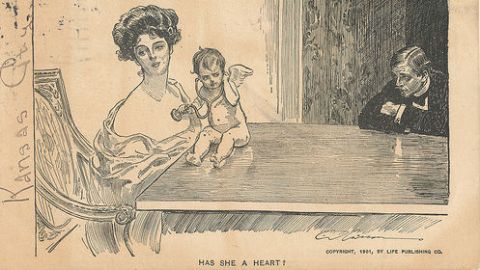The Case for a “Marriage of Convenience”

A 40-something acquaintance is married, with two children. She’s been going through a job transition, so she and her husband are both working out of the home, and it’s not as if it doesn’t show. They’re on each other’s nerves. “I tell you,” she despaired, “if I don’t get back in an office with other people soon I’ll have a marriage of convenience only.”
We both laughed. But I thought to myself, what’s wrong with that?
By its narrow, original definition a marriage of convenience is for purely financial, practical or political motivations. The mariage de convenance got popularized in English in the 1700s and 1800s, just as romantic ideals gained momentum. A marriage of convenience could only be named, and criticized, when an alternative emerged. Before, a “marriage of convenience” would have been redundant.
In modern times, the phrase has broadened into an opposition between marrying “for love” on the one side, and for “some reason other than love,” for “expediency rather than love,” or for any non-love motive, on the other.
You probably know a marriage of convenience. Some of them are of the mildly depressed variety that interests me in my book. The partners don’t appear to have much of a connection, and they’ve probably contemplated divorce, but decided to stay together, perhaps because of parental duty, or for the comforts of habit, or just because they can’t sell their home or afford to divorce. Research finds that divorce rates have dropped because of the recession.
The marriage of convenience is treated like a sad punch line. Still, there’s a case to be made for it.
On the “pro” side, the best thing about a marriage of convenience is that it’s convenient. And convenience is an ever more exotic attribute in our stressed-out times.
If you’re thinking of divorce, it might be the best path. There isn’t a generic right answer to the heart’s complexities, although we’re advised often that there is. But, before you divorce from the marriage of convenience, look around your shared dwelling, and life, and imagine the post-marriage world. Notice the things, routines, and banal conversations you have with your partner. Things will need to be divided, sold, and/or replaced; chores handled easily will have to get discussed and coordinated. Hassles fulminate where none existed before over violin lessons and immunizations. Discussion to resolve picayune matters now involves excessive texting. Pets, to say nothing of children, don’t split 50/50. Costly new households get established, and some never recover financially.
Maybe the homely quality of convenience isn’t such a lame foundation for marriage after all.
And are you ever free from the offending Marriage in Name Only? Not really. You’re free from the marriage, but not from your spouse, if you have children. I chatted with a therapist who warned, “there’s no divorce after children.” You’re still involved with your ex, all the time.
Much to the dismay of the spouse who dreams of a bright-line freedom on the other side of marriage, the divorce proves to be less of a clean break than an unraveling, with persistent, dense entanglement.
Children are usually the most heart-wrenching question. Peer-reviewed divorce research finds that in “high-conflict” marriages, kids are usually better off after divorce. With “low-conflict” unions, they may be better off without divorce. “Our kids don’t give a shit about our happiness,” a friend of mine said before she divorced. They don’t care if we’re “really” in love. If you can get along, that’s good enough. Then again, sociologist Stephanie Coontz observes that having children in a lifeless marriage isn’t great role-modeling, either.
So divorce might still be the best option.
Because, to argue the “con” side, isn’t a marriage of convenience like dragging the carcass of a necrotic relationship on your back for years?
It’s not selfish to want more than that. Some marriages of convenience are nothing short of soul-killing. People use the phrase as a slur is because it implies that the spouse is giving up on life and reasonable standards of happiness, all because they don’t want to move furniture or find an apartment. The incriminating suspicion is that they’re sacrificing what a friend of mine calls their “adult humanity” for flimsy consolations, or to save face.
A friend of mine from grade school grew up gloomily with parents who simmered in resentment and hostility. Anger seemed like a layer of dust in their house. The home was convenient, but it was also quietly, invisibly toxic. The parents didn’t argue, so they would have qualified as low-conflict by research criteria. Instead of arguing, they let their bitterness eat away at them from the inside. My friend and her sister used to dream that their parents would divorce, secretly beseeching them to.
Whether mildly or monumentally sad, a marriage of convenience means this: You’re not going to have all the main aspects of your life fulfilled in one relationship and place. Your marriage isn’t going to be passionate, perhaps, or you’re not going to enjoy intellectual camaraderie with your spouse.
The romantic dream of marriage isn’t going to be your dream, after all. You’ll have to find another dream. Or, you’ll have to find another person.
Or, maybe you’ll find a third way: A marriage of convenience may indeed be worth saving, if–and it’s a monumental if—the spouses are willing to give each other some accommodations and freedoms so that they can meet other vital needs elsewhere, and still enjoy a companionate marriage.
Maybe that would mean marriage sabbaticals, to pursue different interests. Maybe it would mean that spouses aggressively develop other friendships, hobbies and networks, apart from the spouse. It might even entail having a non-monogamous marriage that permitted mistresses or lovers, within rules. Historically, it was precisely these tacit, collusive accommodations that made the marriage of convenience not only tenable but pleasant enough. Women found intimacies in close friendships; men sought mistresses; husbands and wives had parallel, not overlapping, lives in several respects.
If you’re willing to change your idea of marriage, rather than your dream or your spouse, you might be able to stay semi-happily married, for the time being.
It wouldn’t be easy. But neither are the alternatives.





